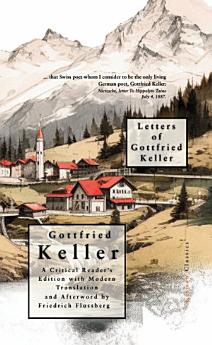Letters of Gottfried Keller
May 2024 · Marchen Press
Ebook
143
Pages
family_home
Eligible
info
reportRatings and reviews aren’t verified Learn More
About this ebook
These letters span 1840-1890, tracking his life across Munich, Zurich, Heidelberg, Berlin and back again to Zurich, where he died. Keller wrote to Friedrich Nietzsche, and Nietzsche warmly expressed his love of Keller's poetry, telling him in a June 1883 letter written from Rome: In reply to your kind letter "Your kind letter", a very amiable letter of thanks from Keller for sending me the "Fröhliche Wissenschaft", and at the same time as confirmation of the thought you expressed in it - that great pain makes people more eloquent than they otherwise are - I would like to recommend to you the enclosed booklet entitled "Thus Spoke Zarathustra". And in a letter to Hippolyte Taine dated July 4, 1887: ... that Swiss poet whom I consider to be the only living German poet, Gottfried Keller. We have lost the letters from Keller to Nietzsche, but Keller's existing letters encompass a wide range of topics, from his artistic aspirations and financial difficulties to intimate confessions of love and reflections on friendship, painting a comprehensive picture of a multifaceted individual navigating the complexities of 19th-century life. Significant figures such as Christian Kapp, father of Johanna Kapp, and Adolf Exner, a professor, appear in the letters, highlighting Keller's intellectual circle. His humorous and affectionate letters to Marie von Frisch née Exner demonstrate his lighter side. Keller's letters to Ferdinand Freiligrath, a fellow poet, and Wilhelm Baumgartner, a friend, reveal his thoughts on the literary scene and his struggles with productivity in Berlin. Correspondences with individuals like Lina Duncker, Ludmilla Assing, and Marie Erner reflect his social engagements and travel arrangements, showcasing his efforts to balance personal relationships and professional commitments. Romantic interests appear in the form of Luise Rieter, to whom Keller confesses his love, and Mrs. Orelli-Breitinger, a motherly friend involved in the response to his love letter. Friends like Johann Salomon Hegi and Rudolf Leemann feature prominently, offering companionship and support, while Eduard Dößekel and Jakob Baechtold serve as confidants in his philosophical and poetic development. Keller frequently writes to his mother, expressing his reliance on her emotional and financial support while detailing his daily life, travels, and artistic endeavors. His close bond with his sister, Regula, is evident in his affectionate mentions and gratitude for her steadfast support. Friends like Steffen, who accompanied him on travels, and Müller, who provided lodging in Frauenfeld, illustrate the network of support that surrounded Keller during his international travels In Munich, Keller interacts with Hegi, his best friend from Zurich, and Fischer, a fellow artist, discussing their shared financial challenges and living conditions. The letters also mention Mr. Vogel and Mrs. Schinz from Zurich, whose opinions on his artistic talent significantly impact Keller's self-esteem and career decisions. This modern critical reader's translation from the original German includes supplementary materials that bring Keller's life and impact to life. Nietzsche considered Keller to be one of the greatest living poets of his time. However, his works are rarely found in other languages, so most people today are unaware of who he was or why he was important. This edition remedies that situation by providing a clear, accessible version of Keller's original German writing and offering insight into his broader ideas and the philosophical landscape in which he operated. Working directly from Keller's German manuscripts, this new translation delivers literary excellence and scholarly depth with amplifying materials. Readers will discover not only Keller's powerful voice but also the philosophical currents that shaped an entire era of German thought. The edition includes an illuminating afterword tracing Keller's intellectual relationship with Nietzsche, revealing the fascinating dialogue between two of the period's most influential minds. A comprehensive timeline connects the major events of Keller's life with his published works, and a detailed index provides an authoritative guide to his complete writings. Together, these materials provide newcomers and serious readers with everything needed to appreciate one of literature's most overlooked figures.
About the author
One of Nietzsche's favorite living poets (the only real Swiss poet in his opinion, Keller was a major Swiss poet and writer, Keller is best known for his novel "Green Henry" (German: "Der grüne Heinrich"). His work is representative of the Realist movement, which sought to depict life and society as they were. Keller's stories often reflect the conflict between individual creative drives and the constraints of society. His novel "The People of Seldwyla" was one of Nietzsche's favorite.
Rate this ebook
Tell us what you think.
Reading information
Smartphones and tablets
Install the Google Play Books app for Android and iPad/iPhone. It syncs automatically with your account and allows you to read online or offline wherever you are.
Laptops and computers
You can listen to audiobooks purchased on Google Play using your computer's web browser.
eReaders and other devices
To read on e-ink devices like Kobo eReaders, you'll need to download a file and transfer it to your device. Follow the detailed Help Center instructions to transfer the files to supported eReaders.







